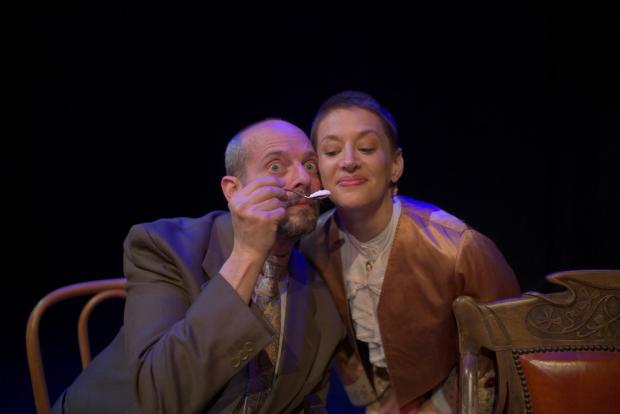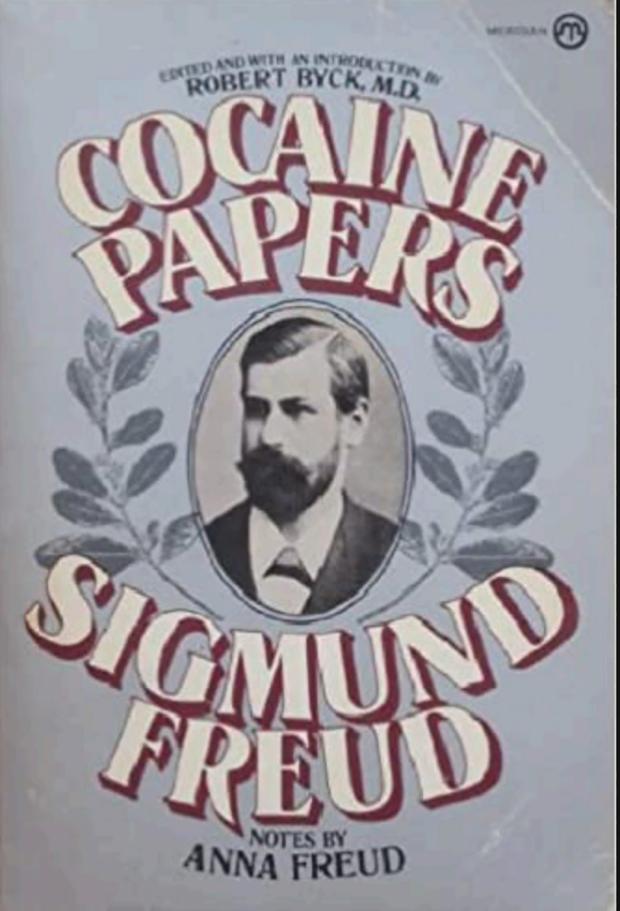Advertisement
According to writer/director Howard Skora’s Freud on Cocaine, during the early days of his career Sigmund Freud was an avid user of and experimenter with coke – if, but of course, for mainly professional purposes. Indeed, there is substantial evidence to support Skora’s contention, notably Dr. Freud’s own writings, such as his 1884 The Cocaine Papers. This subject has previously been dramatized, especially in the wonderful 1976 feature The Seven-Percent-Solution, starring Alan Arkin as a rather compassionate founder of psychoanalysis, who helps Sherlock Holmes (Nicol Williamson) overcome his addiction to cocaine (see the trailer at: https://www.imdb.com/title/tt0075194/?ref_=nv_sr_srsg_0_tt_1_nm_0_q_The%2520Seven%2520Percent%2520Solution).
But in Skora’s two-act play, Freud (Jonathan Slavin) is depicted as being a sort of 19th century Austrian precursor to Timothy Leary, the Harvard clinical psychologist-turned-high (and I do mean “high”) priest of LSD during the psychedelic sixties. (Interestingly, Swiss chemist Albert Hofmann concocted lysergic acid diethylamide next door to Austria at Basel, Switzerland in 1943.) Just as Leary advocated dropping acid to “turn on, tune in and drop out” in order to attain a higher consciousness, Skora’s Freud administers cocaine as a cure-all to early patients, including the hapless Emma Eckstein (Amy Smallman-Winston) and Ernst von Fleischl-Marxow (Aaron LaPlante). Freud treated Ernst with coke in an effort to control his friend and fellow doctor’s addictions to morphine and heroin. Even Sigmund’s fiancée-cum-wife Martha Bernays/ Freud (Sara Maraffino), granddaughter of Hamburg’s chief rabbi, succumbs to blow’s allure under Siggie’s tutelage.
Freud on Cocaine’s first act is very broad, bordering on Cheech and Chong-like comedic schtick about drugs. (BTW, the play’s narrator, Kim Hopkins, rather appropriately appeared in 1980’s Cheech & Chong’s Next Movie.) The show’s featured drug of choice is taken by rollicking characters via snorting or injection, and there is much revelry and euphoria throughout Act I. It’s almost like a dramatization of Freud’s 1905 book Jokes and Their Relation to the Unconscious. Freud’s increasing alleged addiction is played largely for laughs, instead of depicting his mood- and mind-altering dependency as a way for an alienated genius to self-medicate and cope with Viennese society’s repression under the oppressive Austro-Hungarian Empire, as he struggled to become the pathfinder of the unconscious.
However, the dramatis personae who indulge in said snowy substance are, after Freud on Cocaine’s intermission, no longer “driving that train, high on cocaine” (as the Grateful Dead put it) and start paying the proverbial piper. From the peaks to the valleys; after the manic highs come the lows. Act II shows the price of the characters’ drug-fueled freneticism, the costs in terms of physical and mental health. Now a wife and mother, Martha demands that her husband stop his substance abuse, and like many addicts he scorns the notion of abandoning the drug he clings to, which is the source of his solace – and increasingly erratic behavior. As Sigmund himself later acknowledged in his book about what came to be known as “Freudian slips,” there are no such things as “errors.”
The increasingly frantic Ernst’s multiple addictions take their toll on him and Aaron LaPlante proceeds to play what is, in essence, a dual role, also portraying Freud’s own unconscious. If the first act is farce, the second act approaches tragedy. Skora insightfully seems to cleverly allude to the conflicts of interest alleged in dramatizations, reportage and documentaries such as Laura Poitras’ Oscar-nommed 2022 All the Beauty and the Bloodshed, about the Sackler family, medical professionals and the opioid crisis. Freud on Cocaine exposes a purportedly all-too-cozy relationship between Merck, the pharmaceutical enterprise that began way back in 1668 in Darmstadt, Germany, and Freud. According to the play, while a rhapsodic Sigmund was waxing poetic in his influential writings about Merck’s powdery product, Merck was supplying Freud with copious gratis amounts of cocaine, presumably without publicly disclosing this clear ethical conundrum. A dapper Barry Brisco portrays Emanuel Merck, Freud’s purported pusher.
The production incorporates mostly drug-infused music in its P.A. system, notably Jefferson Airplane’s extremely apropos “White Rabbit.” John Knowles’ video projection and design enhances a sense of place, with mural-size images of Freud’s office, Paris, etc., projected in black and white on the stage’s rear wall. Period costumes designed by Michael Mullen also imbue a sense of Vienna in the second half of the 19th century.
Freud’s Viennese office was reportedly filled with artifacts of antiquity – the pioneer of psychoanalysis likened his methodology to that of archaeologists, digging deeper into ever older, embedded layers of the unconscious mind – and the production misses out on an opportunity to visually explore that with a rather plain set sans archaeological curios. Dusti Cunningham’s set does, but of course, include a couch for patients to lie down upon as they divulge their innermost secrets and passions, as the “talking cure” works its magic. Skora ably helms his seven-thesp ensemble in his fourth world premiere of a comedy behind the fourth wall of the Whitefire Theatre.
If that other 19th century German-speaking Jew, Karl Marx, wrote in his 1843 A Contribution to the Critique of Hegel’s Philosophy of Right that “Religion is the opiate of the masses,” what does that make opioids, psychedelics, cocaine, et al? Freud, too, wrote a book critiquing religion, 1927’s The Future of an Illusion, and the notion a la Leary that one can just drop a pill – or snort some blow – to attain enlightenment and overcome one’s personal demons is, like belief in some sort of all-powerful god, nothing but an illusion. And one that can have, as Freud on Cocaine dramatizes, dire consequences. As the Grateful Dead sang:
“Driving that train
High on cocaine
Casey Jones you better
Watch your speed
Trouble ahead
Trouble behind
And you know that notion
Just crossed my mind.”
Fortunately for us, Sigmund Freud, flawed as he and some of his theories were, survived his cocaine-driven idyll-turned-ordeal to write immortal classics such as 1899’s groundbreaking The Interpretation of Dreams (which clearly explained what human beings do with one third of their lives while sleeping) and 1929’s Civilization and its Discontents. About a decade after writing the latter prescient critique, Freud fled “civilized” Vienna as the Nazi menace – arguably history’s worst bad acid trip – threatened the genius who escaped from the tyrannies of drug addiction in his youth and the nightmare of fascism in his old age. Although sometimes over the top, Howard Skora and his cast shed new light on one of humanity’s deepest thinkers by bringing Sigmund Freud, warts and all, back to life. After all, things go better with coke…
Freud on Cocaine plays 8:00 p.m. on Saturdays through November 4 (dark on October 21), at the Whitefire Theatre, 13500 Ventura Blvd., Sherman Oaks, CA 91423. Tickets: https://freudoncocaine.com/; (818)687-8559.



